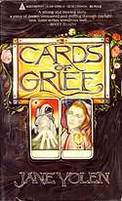The world of L'Lal'lor (points off for unpronouncable words and excessive use of apostrophes) has a culture with an unusual twist. It is strongly focused on mortality, and specifically on grieving; to grieve for one's deceased relatives is one of the most important duties in life. Into this world comes an exploration team, establishing contact and trying to learn about the local culture without affecting it in standard Prime Directive fashion. But one of the anthropologists gets too close and is drawn into the culture he's studying.
So far, this sounds like a fairly typical science fiction first contact story but with an unusual cultural hook. In some respects it is, although unusually told via recordings of a court martial, oral recitations of legends of the world, and stories told by the natives of the world directly involved in the story. This approach worked for me; much of the story is piecing together just what happened and why, and this presentation gives that piecing together more immediacy and connection to the way the researchers are seeing the world. The contact was also more interesting presented largely from the perspective of the natives.
The other side of this novel is the slow unveiling of the way grief, politics, and fertility are entwined in this society and an exploration of the life and character of a particular poet and griever, the Gray Wanderer. This was less successful. She, a noble who first finds her and recognizes her latent talent, and the Queen he brings her to are revealed in their own words and in each other's descriptions, and this works so far as it goes. Gray is an appealing character and interesting to read about. However, their story never turns into anything coherent on a larger scale.
The obsession with grieving is strange and never adequately explained. There is a substantial sub-plot about the two different native races and the difficulty the ruling race has with having children, but it never connected to grieving and seemed only world background. The effects of the alien presence seem to bring political changes that are hinted at in the book but never shown, and one is left with the feeling that the world is changing but with little understanding of how it is changing. It's one thing to write a portrait of several people with no larger intended scope, but a larger scope that is repeatedly hinted at but never gells is frustrating.
I do like Yolen's writing. The pacing is excellent, her writing is clear and expressive, and each character has a unique voice. I liked the slow discovery of what had happened and the way she handled the timing and ordering of scenes. And the question and response format of the interviews, starting with occasional questions and then becoming more interactive later in the book, is very effective. The quiet tragedy and dream-like feel of the story did grow on me.
If she'd put together a coherent larger canvas, this would have been a book to recommend. There's a little traditional first contact story, a little dreamlike fantasy feel without any fantasy, various odd bits of culture that don't fit together, and an ending that didn't tell me enough about the world and didn't pull enough of the loose ends together. I suppose that dreams don't have to make sense, and it was still an enjoyable story, but I finished it feeling dissatisfied and slightly confused.
Reviewed: 2005-11-08
